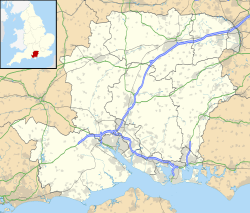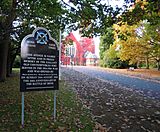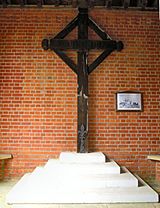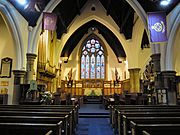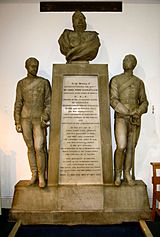Royal Garrison Church, Aldershot facts for kids
Quick facts for kids Royal Garrison Church |
|
|---|---|
| The Royal Garrison Church of All Saints | |
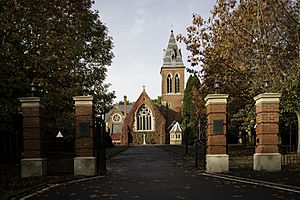 |
|
| 51°15′08″N 0°46′44″W / 51.25209°N 0.77878°W | |
| Location | Farnborough Road Aldershot, Hampshire GU11 1QA |
| Country | England |
| Denomination | Church of England |
| Churchmanship | Central |
| Architecture | |
| Functional status | Active |
| Heritage designation | Grade II listed |
| Designated | 1973 |
| Architect(s) | P. C. Hardwick |
| Style | Gothic Revival |
| Specifications | |
| Number of towers | 1 |
| Materials | English bond red brick |
| Administration | |
| Diocese | Jurisdiction: Bishop to the Forces Location: Diocese of Guildford |
The Royal Garrison Church of All Saints is a special church in Aldershot Garrison, England. It's part of the Church of England. This church was built in 1863. A famous architect named P. C. Hardwick designed it.
The church looks like old Gothic buildings. It is made of red bricks, which is why some people call it "the Red Church"! It's the main church for soldiers and their families in Aldershot. It's also a Grade II listed building, which means it's an important historical place.
Contents
History of the Royal Garrison Church
In 1854, the British Army bought a large area of land in Aldershot. They wanted to build a permanent military camp there. The Crimean War started that same year. This led to a big army build-up. By 1855, about 12,000 huts were built in Aldershot. These huts housed 20,000 soldiers.
It quickly became clear that such a large camp needed a church. So, a small iron building was set up. This was the only church in the Aldershot camp from 1855 until 1863. It was located where the Garrison Church of St Andrew stands today.
In 1857, Parliament decided Aldershot would be a permanent army camp. A new spot was chosen for a bigger, permanent church. This new church was built near the Royal Pavilion. Philip Charles Hardwick designed it in the Gothic Revival style.
The church is 143 feet long and 68 feet wide. It can hold 1,250 people. Its tall spire reaches 170 feet into the sky. It is a well-known landmark in the area. The church was officially opened on July 29, 1863. It is still a Grade II listed building today.
Today, you reach the church by walking along Old Contemptibles Avenue. This road is named after the "Old Contemptibles". These were soldiers from World War I. They used to attend a special service at the church every year. After the service, they would march along this avenue. The avenue was opened on August 24, 1958. This was 44 years after the Battle of Mons.
Inside the church, there are special areas. The Royal Army Dental Corps has a chapel in the southwest corner. It has a green altar cloth with their badges. St Michael's Chapel, also called the Warrior's Chapel, has a beautiful screen around it.
Important Moments at the Church
- 1914: George V, the King, and Queen Mary attended a morning church service on May 19.
- 1923: King George V allowed the church to add "Royal" to its name. It became the Royal Garrison Church.
- 1963: Elizabeth II, the Queen, attended the church's 100th anniversary service.
- 1976: The funeral of General Sir Mervyn Andrew Haldane Butler was held here in January. He was a very important army leader.
The Somme Cross
In the church's south porch, there is a large wooden cross. It is about nine feet tall and made of dark wood. The cross has a message carved into it. It says: "In memory of the Officers, SNCO's and Men of 1st Division killed in action near High Wood during September 1916 - RIP".
At the start of the First World War, the 1st Division was based in Aldershot. But within weeks, they were fighting in the Battle of Mons. In July 1916, the 1st Division fought in the Battle of the Somme. They were part of the Battle of Bazentin Ridge and the Battle of Pozières. There, they attacked German defenses.
The 1st Division then fought at High Wood in September 1916. This battle saw some of the fiercest hand-to-hand fighting of the Somme. Many British and German soldiers died. After the battle, engineers from the 1st Division put up a memorial cross at High Wood. They made it from wood found in the ruined village of Bazentin.
After the war, a permanent stone memorial was built for the 1st Division in France. So, the wooden cross at High Wood needed a new home. It was brought back to the UK. In 1927, the cross was put up outside the 1st Division Headquarters in Aldershot. In January 1939, it was moved inside the church's south porch to protect it. This porch then became known as the 1st Division Porchway. The Somme Cross has been there ever since.
Inside the Church
The Great East Window
This is the biggest stained glass window in the church. The 37th Hampshires, a military regiment, paid for it. It remembers the soldiers from their regiment who died during the Indian Mutiny (1857-1859).
The window's design is from a style popular in churches built between 1307 and 1337. The middle part shows Jesus rising from his tomb. He carries a flag, showing his victory over death. The two panels on the left show Joshua. The two panels on the right show Gideon.
The Altar
The main altars at the front of the church are made of wood. They did not originally have any special cloths. The carving on the front of the main altar is very detailed. It was given to the church by the All Saints Branch of the Guild of St Helene. Different cloths and decorations are used on the altar throughout the year. These have been given by various people.
The Organ
The church organ was built in 1900 by Brindley and Foster. It is the second organ to be in this church. It has 1749 pipes! It also has three keyboards and pedals. It has eighteen "speaking stops," which control different sounds. More stops have been added over time. The shiny pipes on the north aisle screen are just for show. They are not connected to the organ.
The Pulpit
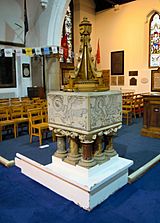
The carved oak pulpit is a memorial to Sir James Alleyn of the RA. It was made in 1899. At the bottom of the pulpit, there are four round shapes. These show the traditional symbols of the Four Evangelists:
- An eagle for St John
- A lion for St Mark
- A bull for St Luke
- An angel for St Matthew
The Font
The font is simple and heavy. It is unusual because it is square, unlike most fonts which are round. On the outside, you can see the symbols of the Four Evangelists. Their names are written in Latin: Sanctus Joannes, Sanctus Marcus, Sanctus Lucas, and Sanctus Mattheus.
The Parachute Regiment Kneelers
Since 1967, this church has been the "spiritual home" for soldiers of The Paras. These are members of the Parachute Regiment. All the soldiers from this regiment who died during World War II are remembered here. Each soldier has their own special kneeler.
Wall Memorials
Many important soldiers are remembered with memorials on the church walls. These include Frederick Arthur Montague Browning, James Yorke Scarlett, James Hope Grant, Henry Renny, Henry Jenner Scobell, and Neil Douglas Findlay.
The memorial for James Yorke Scarlett has a bronze statue of him. On either side are two life-sized bronze cavalry soldiers. They are from his old regiments, the 18th Hussars and 5th Dragoon Guards. They wear medals like the VC and Crimean War medals.
Images for kids
 | William Lucy |
 | Charles Hayes |
 | Cleveland Robinson |


